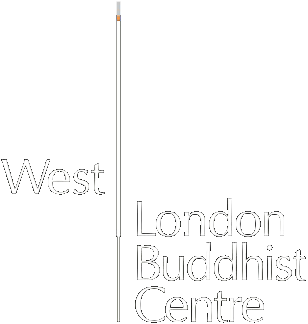Dharma bites – Ratnadeva asks ‘In such times of uncertainty, where do we place our trust?’
In daily conversation, on social and mass media, we are getting used to a new and unsettling vocabulary – ‘lockdown’, ‘self-isolation’, ‘social-distancing’, ‘furloughing’. Other more familiar words ride piggyback – ‘crisis’, ‘unprecedented’, ‘war’, ‘frontline’. This is all a language of uncertainty and the natural response to uncertainty is fear.
 The Buddha speaks to times like these. He tells us that our happiness does not depend primarily on external conditions (e.g. disease, threat, uncertainty), but on our response to those conditions (e.g. aversion, anxiety, feelings of helplessness, on the one hand, or acceptance, confidence, and trust, on the other). In the second Noble Truth he tells us that whenever we react to experience with craving or aversion, suffering is inevitable. The cause of suffering is an artefact of our own minds. Therefore the solution to suffering is also to be found in our minds. We can trust in this simple but hugely consequential teaching. However, the Buddha tells us not to take any of his teachings on faith – we are to trust them on the basis of trying them out for ourselves and experiencing their effectiveness first hand.
The Buddha speaks to times like these. He tells us that our happiness does not depend primarily on external conditions (e.g. disease, threat, uncertainty), but on our response to those conditions (e.g. aversion, anxiety, feelings of helplessness, on the one hand, or acceptance, confidence, and trust, on the other). In the second Noble Truth he tells us that whenever we react to experience with craving or aversion, suffering is inevitable. The cause of suffering is an artefact of our own minds. Therefore the solution to suffering is also to be found in our minds. We can trust in this simple but hugely consequential teaching. However, the Buddha tells us not to take any of his teachings on faith – we are to trust them on the basis of trying them out for ourselves and experiencing their effectiveness first hand.
How might we put the second Noble Truth to the test in the Time of COVID-19? One simple approach that the Buddha teaches is to notice and dwell on the quality of pleasantness or unpleasantness of our day-to-day experiences. Unpleasantness is not in short supply these days – hearing the latest tally of increasing infection and death rates, the accounts of NHS staff working under huge strain, news of an embattled economy. How does this news register in your felt experience? The Buddha tells us to notice ‘feelings as feelings’. This is an ingenious strategy. It puts a break on a natural, but painful sequence of events: identification of the cause of unpleasantness and locking onto that cause, leading to the arising of aversion towards the cause. When we dwell on the feeling of unpleasantness and how it manifests in the body, we also gain an immediate experience of the shifting, impermanent nature of the feeling.
This is a double boon – we avoid reacting to the news (e.g. blame – ‘it’s the government’s fault’, or anxiety – ‘how are my elderly parents going to get through this’, or aversion ‘I hate those joggers in the park who don’t keep their distance’) – a reaction that only adds to our suffering. Furthermore, we gain insight into the universal law of impermanance – whatever arises, passes away. Every occasion that we pull this off and forestall aversion, we’re training our minds to unhook from painful automatic reaction, to open a window of conscious choice and a window onto how things really are. Each and every painful experience then becomes an opportunity to cultivate freedom and insight.

